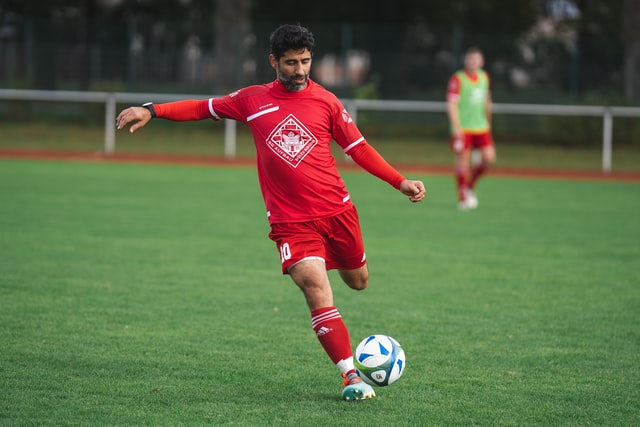Sir Alex Ferguson famously said – “If you’re good enough, you’re old enough. This philosophy rings true in the world of soccer, and players can reach their peak in their teens, twenties, or thirties.
But at what age do soccer players decline? Is there a typical age they start to slow down and make mistakes?
While everyone is different, there is an age that soccer players start to look past their best, as we explore below.
At what age are soccer players past their best?
When a soccer player reaches the age of thirty, they are often seen to have peaked and started their decline. Of course, there are exceptions to this rule, but thirty is often seen as the age when many players are past their best. This is when the body starts to feel the effects of physical sport, and many players lose some of their pace and power. It’s not common for professional teams to have too many players over thirty.
Do soccer players have to retire at a certain age?
There’s no requirement for soccer players to retire at any age. Providing you are fit, healthy, and up to the challenge, you can play soccer for as long as you like!
This is important to recognize because everyone functions differently. Biologically, some players can maintain incredible fitness levels when they pass the age of thirty.
Just look at Cristiano Ronaldo.
CR7 is 37 at the time of writing, and he is one of the fittest and most able soccer players in the EPL. But, on the other hand, Ronaldo is known to have the physical capabilities of someone much younger, maybe even a twenty-year-old.
He keeps himself in such good shape that he has 7% body fat and a muscle mass of 50%. In other words, CR7 is in prime physical condition.
Even though he is 37 and way past the age that soccer players decline in most ages, Ronaldo is still one of the very best players in European soccer.
Unless he gets injured, there’s a genuine possibility that CR7 will play into his forties and will still be performing at the very top level of the game.
What happens when a soccer player becomes too old to play?
If a soccer player declines to the point where they feel no longer capable of playing at the required level, they will decide to retire. Most players hang up their boots between the ages of 32-37, but it really just depends on what kind of shape they’re in.
After retiring, soccer players do a range of things, including:
- Make the transition into coaching
- Become pundits and commentators
- Leave soccer entirely and start their own business
- Look for other ways of staying involved in the game
Although not popular with professional soccer players, amateur soccer players often get involved in walking soccer when they’re too old to play the regular version of the game.
Walking soccer is very similar to traditional soccer, but with one key difference – you’re only allowed to walk! This takes much of the physical difficulty out of the game and makes soccer available to those who have declined in recent years.
Who is the oldest soccer player in the world?
In 2022, the oldest soccer player in the world is Kazuyoshi Miura, who is still playing professionally at the age of 54!
After leaving Yokohama FC, Miura joined the Suzuki Point Getters on loan, who are coached by his older brother. Known in his native country as King Kazu, he started his professional career in 1986.
Although he’s certainly not as agile as he once was and is showing signs of decline in terms of his physical capabilities, King Kazu is still going strong and is not interested in retiring any time soon!
Looking back in history, here are some of the most notable players to have continued playing soccer long past the widely accepted ‘age of decline’:
- At the age of 40 years and 272 years, Teddy Sheringham is the oldest outfield player ever to have played in the English Premier League.
- Brazil legend Rivaldo made his final professional performance for Mogi Mirim at the age of 43 years and 117 days.
- Aleksander Duric played for Tampines Rovers in Singapore until the age of 44 years and 85 days.
- The late and great Sir Stanley Matthews – one of England’s finest players – played his last game for Stoke City five days after turning fifty.
As you can see, these legends of the game showed no sign of decline at the age of thirty and went on to enjoy long and impressive careers!
The verdict: When do soccer players decline?
As we have shown, some soccer players decline at the age of thirty when their bodies start to feel the effects of physical exertion.
However, as our examples have proven, some players go on to have long and successful professional careers into their forties and even fifties!
Ultimately, if you look after yourself as a soccer player, you can play as long as you like and are much less likely to suffer from decline.


One thought on “What Age Do Soccer Players Decline?”